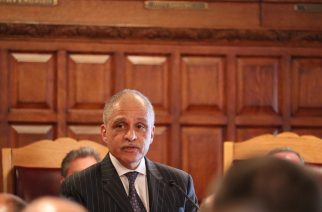
State Attorney General candidate Zephyr Teachout hosted a livestream in Foley Square announcing her support for two bills aimed at protecting public employees working in political offices.
Title VII of the federal Civil Rights Act of 1964 includes a loophole for the “personal staff” of elected officials, exempting them from some protections against discrimination and harassment.
Teachout and others say recent news concerning the Governor’s Office clearly shows a need to better protect — and give more legal recourse to — those who work for elected officials in all levels of government.
Teachout, who challenged former Gov. Andrew Cuomo in the 2014 Democratic primary, was joined at the press conference in lower Manhattan by Erica Vladimer, co-founder of the New York Sexual Harassment Working Group; Marisa Hoechstetter, founder of Reform the SCU; and Rita Joseph, councilwoman-elect for New York City Council District 40.
Advocating specifically for workers of political offices who are not federally covered by laws concerning sexual assault, these individuals spoke out in support of two bills with one ensuring all state and public employers are subject to the human rights law, as well as increasing the statute of limitations for sex offenses against those 18 or older.
Join me + @RitaJosephNYC, @MHoechstetter + @EricaForNY to push for an era of accountability for survivors in New York State https://t.co/EvRfo69OZa
— Zephyr Teachout (@ZephyrTeachout) November 17, 2021
They support a bill in the state Legislature that would close the “license to harass” loophole would amend the state’s Human Rights Law to classify staff of elected and appointed officials as employees of the government entity for which they work; whether it is New York state, or a city, county or local municipality.
That bill (S.3395-a/A.2483-b) is sponsored by Sen. Andrew Gounardes, D-Bay Ridge, and Assemblywoman Yuh-Line Niou, D-Lower Manhattan, and focuses on removing the Title VII Civil Rights Act loophole, “which excludes elected officials and their ‘personal staff’ from protections against harassment.”
“You guys know what it’s like,” Teachout said, “when you are sitting in the car crying because you don’t know who to report to.” These exemptions, sometimes referred to “license to harass exemptions,” both harm the victim and lead to a massive loss of talent within public workplaces, Teachout said.
“Sexual misconduct and abuse is an attack on human dignity and it’s compounded when institutions like the criminal justice system, JCOPE, or corporations fail to prioritize justice. Survivors deserve the same protections as any other employee or victim, and access to the civil courts when they don’t get it,” Teachout said.
Teachout launched a bid for New York State Attorney General on November 15.
Another bill, known as the Adult Survivors Act, would open a one-year look-back window for time-barred survivors — who were over the age of 18 at the time of their abuse — to sue their abuser, or the institution that protected their abuser, in civil court.
The bill is modeled on the Child Victims Act which has allowed 10,000 time-barred survivors of childhood sexual abuse to file civil suits in New York state.
The legislation (A.648/S.66) is sponsored by Brad Holyman, D-Greenwich Village, and Linda Rosenthal, D-Upper West Side. Nicknamed the “Adult Survivors Act”, the bill focuses on providing victims with the necessary tools to prosecute against their harassers by increasing the statute of limitations to include a one year window to begin legal action after the date of harassment.
Supporters of the bills say their passage is urgent, following Andrew Cuomo possibly avoiding legal action concerning his alleged touching of a former aide, highlighting the issue in state government.
“There is no way to have a real public reckoning for sexual assault without access to justice and institutional accountability,” Hoechstetter said.









